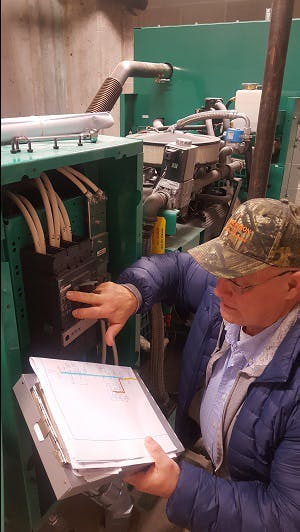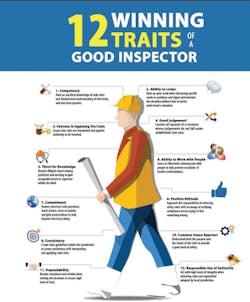Electricians spend many years attending apprenticeship school before testing for their electrical license. On top of that, they work under the supervision of licensed electrical professionals to obtain the on-the-job training hours that apply to this endeavor. They provide a vital service toward electrical safety through the work they install and the knowledge and skills they bring to the construction industry. Most of these individuals start their electrical careers in their early 20s. Many of us can remember those times — we were able to do the physical work associated with the electrical profession and get up the next day recharged and ready to go again. But time has a way of playing cruel tricks on the human body. Those days of getting up and installing 2-inch rigid conduit over your head or 3-inch PVC down in a trench gets harder every year. So what’s your game plan to continue in the electrical profession if your body says no more?
I ask this question all the time to young apprentices or electricians I encounter at trade shows or training events. As you can expect, I get some pretty stone-faced looks from young professionals who have just started out in the trade and consider themselves 10-foot-tall and bulletproof. As you start to experience these changes and progress through the electrical professional, I recommend you consider continuing your journey by becoming an electrical inspector.
Physical versus mental work
When you consider this transition, it may not occur to you that you will be leaving behind a lot of daily physical work in exchange for more mental work. Many electricians feel they have a commanding understanding of the National Electrical Code (NEC). Once this transition is made, however, many find out that this may not be the case.
Once you become the authority having jurisdiction (AHJ), some things are expected of you. There is a sudden expectation from the contractors in your municipality or jurisdiction that you are an expert on every facet of the rules and ordinances that are in force governing electrical installations.
Traits of a good electrical inspector
A good electrical inspector is developed over many years of training (see the Figure on page 30). Many of these individuals possess a strong understanding of the electrical requirements for installing electrical devices and equipment. This has happened due to being a licensed electrician or electrical contractor for many years. However, being knowledgeable about the NEC, the National Electrical Installation Standards (NEIS), Underwriters Laboratories (UL) standards as well as other documents is not all that is necessary to become a good electrical inspector. Proper communication is important between all parties associated with an electrical installation. A good electrical inspector can easily communicate with contractors, elected officials, and the public. This person has a passion for learning more and more about the electrical industry to ensure the safety of the community in which they serve.
requirements of the codes and standards consistently. Much like an umpire calling balls and strikes, as long as the inspector is fair and consistent, everyone gets along. As it is in every profession, of course, there are a individuals who give all inspectors a bad name. But this is definitely the exception rather than the norm.
Civility between the contractor and the AHJ is critical. Adversarial relationships are not beneficial to maintaining a working relationship. As it was once explained to me by a seasoned building official, “Never wrestle with a pig in the mud. All that will happen is you will get dirty and find out that the pig enjoys it!” No one wins in an adversarial situation, but the AHJ (aka the pig) many times has the final say and enjoys that benefit.
As electrical professionals, we need to build each other up by teaching each other the correct and compliant ways to install or inspect electrical work. Proper training and employing individuals with exceptional expertise, impeccable moral integrity, and a passion for safety will ensure a safe future for everyone involved.
Education and certification needs
An electrician may decide that he/she would like to transition into an electrical inspection career. In many cases, this career change also involves higher salary and benefits.
Each jurisdiction will have specific requirements when looking for a person to fill an inspector’s role. Some want the individual to hold an electrical license. Some are looking for a person who has various certifications from a reputable association showing competence in the construction trades. Strangely enough, some look for someone they can bring in and teach what needs to be done and do not put an emphasis on licensure or certification.
The IAEI has certified electrical inspector certifications that can help you with your career transition. These certifications test an individual on their understanding of the NEC as well as their ability to apply it to everyday situations. These exams also have a practicum phase portion that the applicant must complete to show competence and understanding of the electrical inspection process. Additional information can be found at the IAEI website by going to www.iaei.org/page/certification.
The IAEI has also partnered with the ICC to produce the IAEI/ICC Electrical Inspector Joint Certification Program. Certificate holders can expect to receive recognition in the U.S. nationally, experience increased job opportunities, and improve mobility within the building safety industry. For additional information, visit the ICC website at https://www.iccsafe.org/professional-development/icc-iaei-electrical-inspector-joint-certification-program/.
Another resource that will aid in the development of individuals wanting to transition into the electrical inspection field is a book produced by the IAEI entitled “Becoming the Electrical Inspector.” This book contains information about state licensing and certification requirements, benefits (such as hourly pay and vacation), public speaking skills, and much more.
The future is up to you.
It is often said that when you find a job you love, you’ll never work another day in your life. But when the time comes that you don’t want to roll out of bed and install that cable tray system or pull that 500 kcmil conductor into an underground raceway, think about becoming an electrical inspector. It is a great way to transition into another electrical professional career that desperately needs you. The safety of future electrical installations as well as the safety of the public need your years of knowledge and dedication. Electrical professionals around the world are depending on you to answer this call.
Early Engagement with the IAEI
Most electricians learn about the Independent Alliance of the Electrical Industry (IAEI), formerly the International Association of Electrical Inspectors, several years after beginning their electrical careers — in many cases, 20 to 25 years well into their professional careers. This usually happens once a career change is being considered or when they have an opportunity to attend an electrical continuing education course offered by the IAEI toward licensing or certification.
What might happen if these individuals engaged with the IAEI during the beginning of their journey? Maybe there would be a greater understanding of the responsibilities of the inspection authorities and a better working relationship between the two. This would create a relationship between all electrical professionals towards a shared goal of electrically safe electrical installations.
Most electricians and other electrical professionals continue to have a misperception that to be a part of the IAEI one must be an electrical inspector. This has never been the case in the 90-plus years of the association. During this time, the IAEI has benefited from having members that represent all facets of the electrical industry. This is what has made the IAEI meeting such an incredible and career-advancing event. Members of all phases of the electrical profession discuss the various aspects of the industry with each other. Learning from each other and taking this knowledge back to their communities and businesses throughout the world.
I would encourage you to engage with the IAEI by becoming a member or attending the various meetings held all around the country. Check your area, and see where the next meeting will be held. Show up and begin the process of building important relationships that will increase your knowledge and understanding of the electrical industry. Receive continuing education toward your license renewal or certification needs. Get a jumpstart on others by getting the electrical certifications that will benefit you when that next electrical inspector position is up for grabs.
About the Author
Joseph Wages, Jr.
Joseph Wages, Jr., is the director of education with IAEI. Previously, he held the positions of technical advisor, education, codes and standards and seminar coordinator at IAEI. He represents IAEI on NFPA’s NEC Code Making Panel-14 for the 2026 NEC. He previously represented IAEI on NFPA’s NEC Code Making Panel-2 for the 2020 and 2023 NEC code cycles and NFPA’s NEC Code Making Panel-3 for the 2014 and 2017 NEC.
He serves on the Underwriters Laboratories (UL) Electrical Council and on several UL Technical Standard Panels. Joseph continues to hold state electrical licenses and several IAEI and ICC building related certifications. Joseph can be reached at [email protected].


